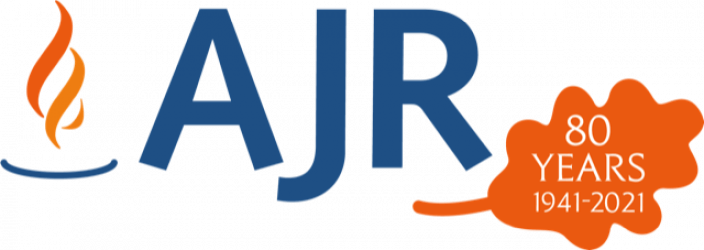AJR organises a number of events each year such as Holocaust Memorial Day remembrance services in January and Kristallnacht memorial services in November, as well as supporting other national events like Yom HaShoah
Kristallnacht Commemorative Service
The annual Kristallnacht Commemorative Service will be held at Belsize Square Synagogue, 51 Belsize Square, London, NW3 4HX on Thursday 9th November. Belsize Squares Rabbi Stuart Altschuler will lead the service and as well as a guest speaker, an AJR member will give their perspective on the night of 9th November 1938. Light refreshments will be served at the end of the service. For planning and security please email Karin Pereira atkarin@ajr.positive-dedicated.net if you are able to attend.

September Serenade 2017
AJR welcomed members and their families to the September Serenade, an opportunity to meet up with old friends and enjoy a delicious lunch and top-class operatic entertainment. In his welcome speech, AJR Chairman Andrew Kaufman described the event as a highlight of the AJRs calendar before mentioning plans to mark the forthcoming 80th anniversaries of Kristallnacht and the creation of the Kindertransport in 2018."Kaufman said It is the AJRs great honour to now be the leading benefactor in the fields of Holocaust education and memorialisation programmes and projects. We see this area of our work developing greatly in the future but we are equally not distracted from our primary task: to deliver transformative social and welfare services to our members."
Formalities over, guests had plenty of time to enjoy lunch and the 'September Serenade' programme performed by Jonathan Fisher (Baritone),Glenys Groves (Soprano), Alexandra Naoumeno (Tenor/Piano) and Scilla Stewart (Mezzo/Piano). There was much laughter during 'Habanera' from Carmen, when Scilla roamed the audience to find possible 'amours', even sitting on one or two gentlemen' knees. This was followed by Scilla and Glenys dancing with members of the audience during the final.

Holocaust Memorial Day 2017
Holocaust Memorial Day 2017 AJR held its annual Holocaust Memorial day ceremony at the Belsize Square synagogue. Speakers included Rabbi Rodney Mariner who led the services, HE Dr Peter Ammon, the German Ambassador, Eva Clarke who was born in the Mathausen Concentration Camp in May 1945 and Merrit Jagusch from Action Reconciliation Service for Peace.

All AJR members are welcome to attend the Sobell Centre which meets in the Jewish Care building, Amelie House, at 221 Golders Green Road, London NW11 9DQ every Tuesday and Thursday. Activities include including arts and crafts, a discussion group, painting, exercise classes and a music group as well as bridge games and Rummikub. Freshly prepared hot and cold, non-meat cooked lunches are served before an afternoon entertainment programme.
Transport can be arranged for members who otherwise would not be able to attend. Please email the coordinator if you would like to attend or to find out more about the activities at Sobell.
The AJR operates a nationwide network of Regional Groups that offer our members a unique opportunity to socialise with friends of similar backgrounds. In addition to organising local meetings, outings, coffee mornings, garden and tea parties, our outreach co-ordinators also arrange national and regional get-togethers. It is at such gatherings that many old friends have been reunited and new friendships formed.
The Outreach Department at AJR co-ordinates 43 different regional groups holding 300+ events each year, collectively attended by over 1500 different AJR members all over the UK. Each regional group has its own characteristics. Some exist just for social events, while others always have expert speakers. Some meet every month in local shuls or community halls, while others meet less frequently in different members’ homes. Some have only a handful of members while others regularly draw large crowds.The newest group is Muswell Hill, catering for AJR members between Highgate and Crouch End and it has already attracted eight new AJR members.A huge amount of effort goes to keeping events interesting. Co-ordinators meet bi-monthly to share ideas and members are welcome to make suggestions too. They are constantly looking for new things to do, while being mindful that some of the older members are less physically able so every activity or outing is very carefully planned.
As well as monthly meetings there are also day trips and longer trips like the four-day visit to Liverpool in Spring 2017. In preparation for the excursion to Liverpool three members of the Outreach Department road-tested the entire itinerary before they advertised the trip, including mapping all toilet stops! The team prides itself on its thoroughness. Two AJR Social Workers accompany the AJR members and the Outreach team co-ordinators on each residential trip, and the AJR team meets each morning of the trip to go through the day’s itinerary in detail and resolve any potential issues. And the same attention to detail is applied to regional events and meetings, including to pre- and post-travel.AJR policy is that no member should have to miss an event simply because they can’t get there, so we have a travel budget specifically for this purpose.
The events also allow Co-ordinators to help members with individual issues. While a member might not think of asking for help with something they are struggling with, be it a health, legal or financial problem for example, but they might mention it while chatting in a relaxed environment and then can be referred to AJR colleagues who are experts in that particular field. Recent years have seen increasing numbers of 2nd Generation and even 3rd Generation survivors and refugees attending events. The mix of different generations makes for lively discussions and helps younger generations to feel connected to their roots, particularly after their own parents or grandparents have passed on. For some members, especially those in the regions, AJR events are the only opportunities to mix with other people from a shared background. Even members who don’t want to talk about their or their families’ Holocaust experiences seem to benefit from the unspoken bond that exists.
